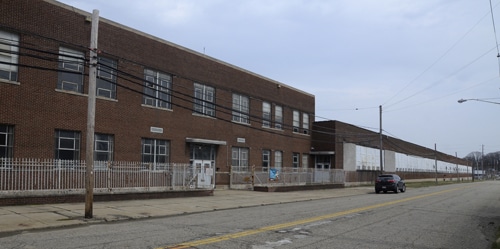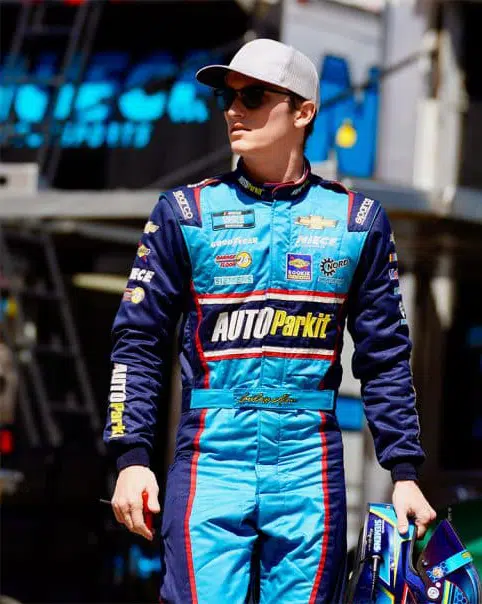Tribune Chronicle / R. Michael Semple This is an exterior view of the former Delphi plant where Warren native Christopher Alan wants to build his AutoParkit manufacturing facility. He said he met with the property owner last week and expects to hear soon about the sale of the land.
WARREN – Parking lot use is on the decline, but that isn’t worrying the man who wants to bring to Warren his company that builds automated parking decks used in large cities.
The increase of ride-sharing companies and the future of driverless cars has analysts predicting a reduced need for parking space, particularly in major metropolitan areas. But that’s exactly where products built by Los Angeles-based AutoParkit are used.
This downward parking trend is coming just as Warren awaits word from AutoParkit owner Christopher Alan on whether his plan to bring an AutoParkit manufacturing plant to the former Packard Electric space on Dana Street here will come to fruition. Alan said he met last week with the owner of the Dana Street property and is expecting to hear a decision about the sale of the land very soon.
Increased usage of ride-sharing companies like Uber and Lyft, coupled with the expected development of driverless cars, will work to reduce the need for parking spaces around the country, say experts like Cleveland State University professor of Urban Affairs Robert Simons.
Improved mass transit, coupled by the high cost of automobile ownership, including fuel, insurance and parking, may be other factors triggering motorists to rethink their need to drive and park in the city every day.
Simons said he expects the need for parking spaces to decline as more people become accustomed to using ride-sharing companies.
“There are some people who will decide it is better for them to use these services daily than to drive cars into congested downtown areas, find and pay for parking,” Simons said.
The biggest long-term impact may be upcoming development and use of driverless vehicles.
Driverless cars carry GPS technology that eliminates the need to look up routes and allows the cars to navigate faster than human drivers. They also require no down time for rest, which means less need for parking.
University of Texas at Austin professor of transportation engineering Kara Kockelman told Mother Jones magazine last year that a university study determined one autonomous ride-sharing vehicle could replace up to a dozen regular cars. The robocars could drive all day and all night, stopping only for fuel and maintenance. The result is a 90 percent reduction in the need for parking.
Statistics show in Los Angeles County, for example, roughly 200 square miles – about 14 percent of the land – is used for parking. McKinsey & Company, a global automotive consulting firm, maintains that autonomous vehicles could reduce the need for parking space in the United States by more than 2,200 square miles.
And the development of the self-driving vehicle industry, CSUás Simons said, could move quickly.
“We are at the stage right now similar to more than 100 years ago, when horses were the dominant form of transportation and cars were new and relatively rare,” Simons said. “It only took 30 to 40 years for cars to become dominant and horses were only owned for hobbies.”
Still, Alan sees no cause for concern, and instead believes the new driverless car technology can work seamlessly with his automated parking system.
“We are a technology leader in parking. … We will have driverless cars working with automatic parking facilities,” Alan said. “The cars will be parked and can be charged, cleaned and serviced at our sites. People hiring zip cars can present their account numbers at our site and the cars will be delivered to the customer.”
Marshall Brown, an associate professor at Illinois Institute of Technology College of Architecture, who was part of a study looking at the impact of driverless vehicles, isn’t as convinced. Rather, Brown is taking a wait-and-see attitude, noting that it is hard to predict what kind of impact these vehicles will have on whether there will be more or less parking in any given community.
“Technology does not dictate anything,” Brown said. “It is really where people are located, which technologies are adopted and how they will be used. There are political and economic issues that impact what happens. It is very complicated.”
I can see areas where there will be increased need for parking facilities in some communities which have dense populations, but I also can envision scenarios where parking decks will be obsolete.ã
Because city planners and analysts argue that most U.S. cities use existing parking space ineffectively, Alan said that only adds steam to his marketability. That’s because AutoParkit garages are smaller and more cost effective than the traditional parking garage.
“They are less intrusive,” he said.
Alan’s point was backed up by Norman W. Garrick, associate professor of civil and environmental engineering at the University of Connecticut.
“These cities are re-examining their land use. There are those who believe the land is more valuable to construct buildings that can be used for office or living spaces. More people are seeing their city core as places they want to live and to socialize,” Garrick said. “They can’t afford for their communities to be a wasteland of parking spaces.”
“Communities are reversing the patterns of the 1950s and 1960s when cities were subsidizing the growth in the number of parking lots being built,” Garrick said.
“The industry already is changing as large parking conglomerates are leasing existing parking spaces for 10-, 20-, 30-year periods at universities, like Ohio State University and in cities like Chicago, and releasing them to individuals and companies,” Simons said. He teaches at the Levin College of Urban Affairs at Cleveland State.
Companies that lease parking facilities, include QIC Global Infrastructure, which in 2012 signed a 50-year, $483 million lease to manage parking at Ohio State University.
Alan said, however, that contracting these services with companies like AutoParkit makes things tidier because of the available automation.
“We would be ideal for universities and communities considering these long-term lease agreements because they pay companies to manage their parking systems,” Alan said. “If they hire AutoParkit, everything would be automated and there is not a need for a management company. Everything would be fully automated. We can increase their parking revenues without increasing their staffs.”
Alan also pointed out that drivers who work for these services still need someplace to park between calls.




